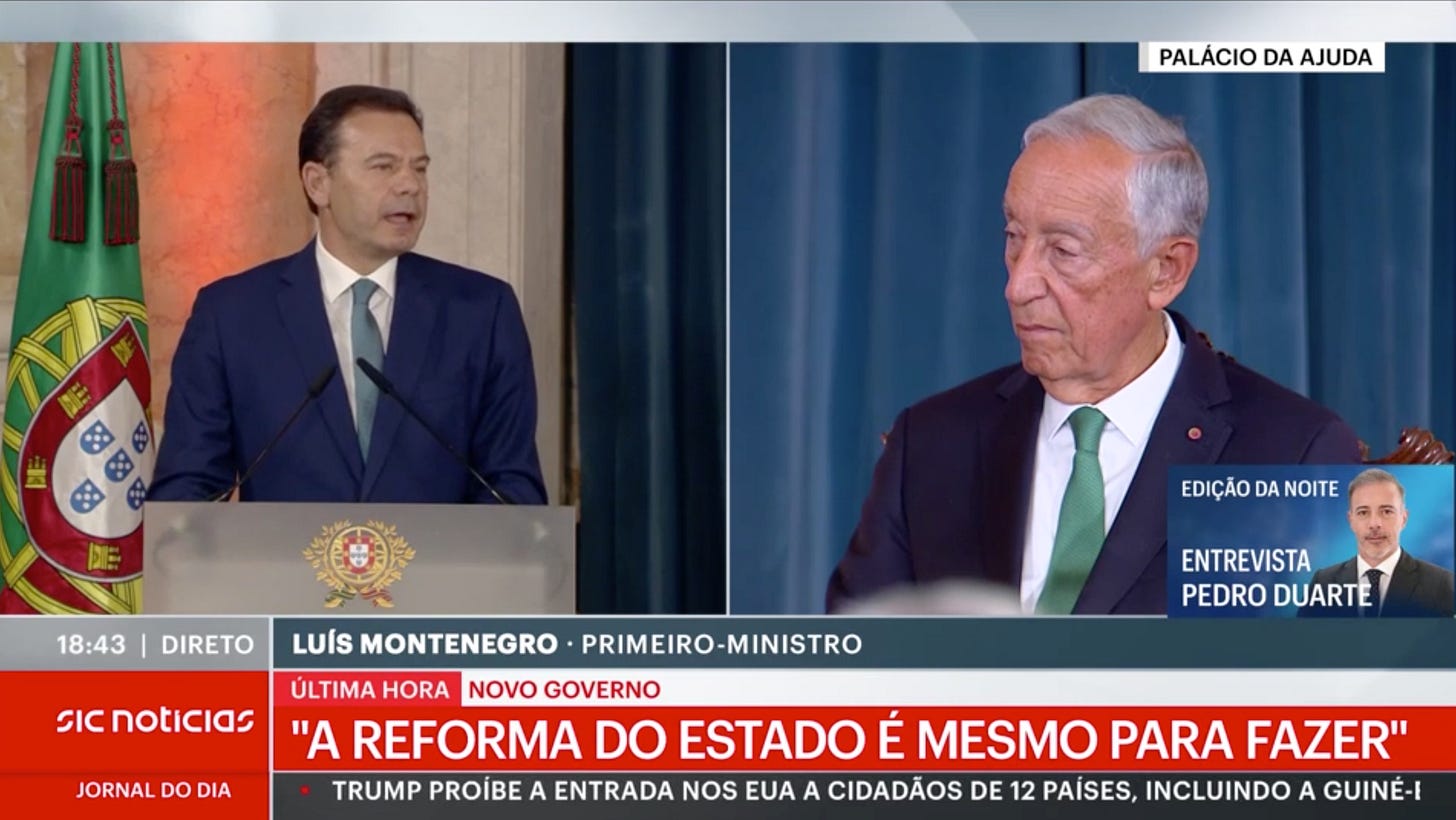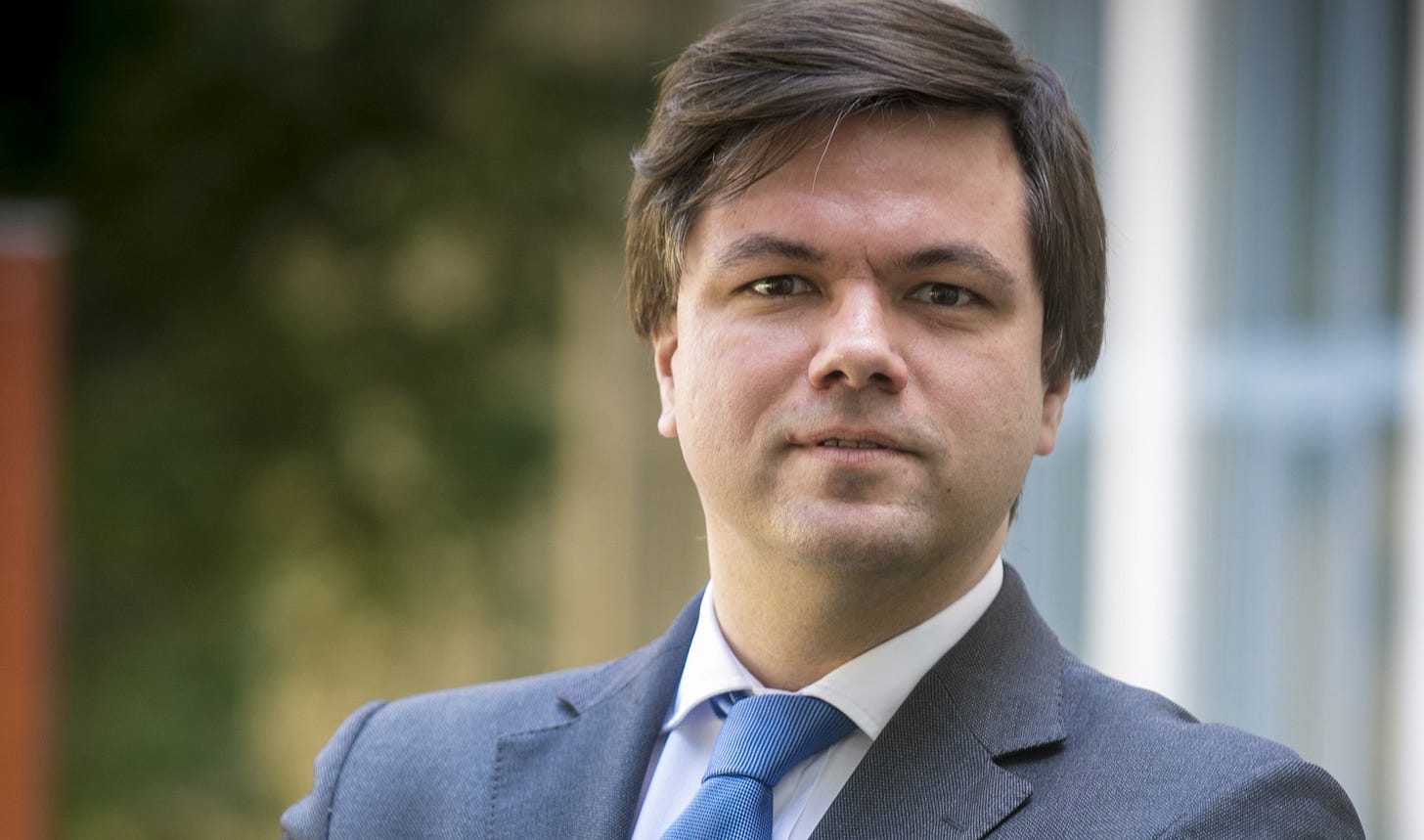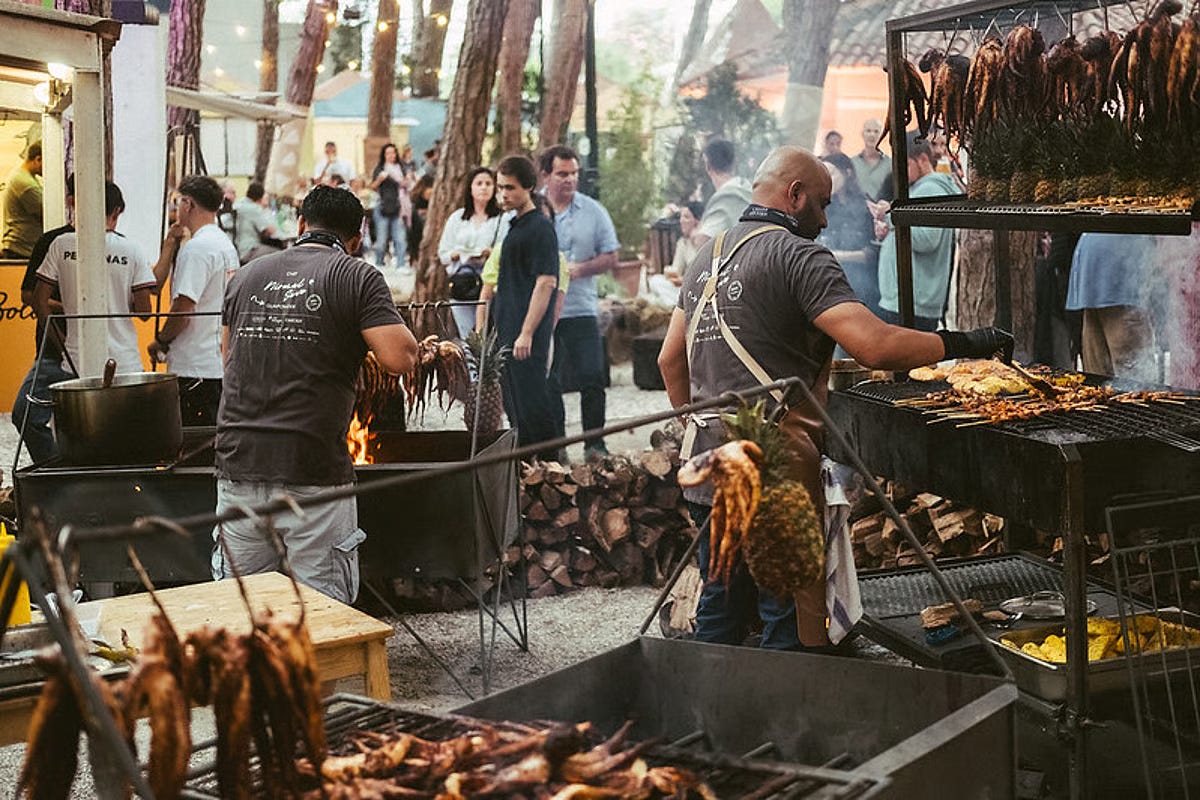Friday Briefing: New government declares "war on bureaucracy"
Good morning and welcome to PORTUGAL DECODED. The new government took office yesterday, and the PM announced that cutting red tape will be the Executive’s top priority. Here's what you need to know.
TALK OF THE TOWN

If you enjoy reading PORTUGAL DECODED, please consider donating to keep it free and independent – your generosity means everything!
POLITICS
Signaling that instability is far from over, frontrunner in January’26 Presidential race Henrique Gouveia e Melo reaffirmed his centrist stance but left open the possibility of dissolving Parliament if PM Montenegro is formally indicted (More).
Rui Rocha resigned as leader of the Liberals (IL), surprising many, including members within his own party. His departure comes at a critical time, as the party is poised to play a key role within a hung Parliament (More).
SOCIETY
Dozens of Portuguese cultural and political figures launched a petition urging the Government to recognize Palestine. Meanwhile, President Marcelo was confronted at the Lisbon Book Fair by a protester accusing the government of inaction (More).
German police resumed searches in Portugal for evidence linking Christian Brueckner to Madeleine McCann’s disappearance, fearing he may flee after his September release from a 7-year sentence for a 2005 rape in the Algarve (More).
ECONOMICS
Nearly 34,000 foreign nationals in Portugal, mostly of South Asian origin, may be ordered to leave after residency rejections. The government also announced significant progress in clearing over 400,000 pending immigration cases (More).
The OECD cut Portugal’s growth forecast to 1.9% and predicts a return to a budget deficit in 2026, citing weaker exports, global headwinds, and inflation, despite strong domestic demand and investment support (More).
CULTURE AND SPORTS
Eduardo Gageiro, iconic Portuguese photojournalist known for being one of the first photographers on the scene during the April 25 revolution, died aged 90. He left a vast archive documenting Portugal’s history (More).
Portugal football team beat Germany 2-1 in Munich, with goals from Francisco Conceição and Cristiano Ronaldo, securing a spot on Sunday’s Nations League’s final and their first win over Germany in 25 years (More).
If you enjoy reading PORTUGAL DECODED, please consider donating to keep it free and independent – your generosity means everything!
DECODER
How has the new government been received so far?
Reactions to the new government have been mixed. Some welcomed PM Luís Montenegro’s decision to retain most ministers, seeing it as a signal of continuity and stability. Writing in Público, commentator João Miguel Tavares noted: “(His) political survival depends on a serious attempt to change the country. The choices of Maria Lúcia Amaral as Minister of Home Affairs and Gonçalo Matias as Minister of State Reform give me some hope in this regard. Luís Montenegro’s second government is significantly better than the first.” However, critics have raised three key concerns. First, the reappointment of Ana Paula Martins as Health Minister faced significant backlash. Chega leader André Ventura called the move “deeply wrong,” accusing Montenegro of being “stubborn.” Second, the decision to merge the Ministry of Culture with Youth and Sport was met with disapproval. Gabriela Canavilhas, former Culture Minister (2009–2011) under a Socialist government, told Observador: “This is a clear devaluation of Culture.” Finally, the creation of a new Ministry for State Reform drew skepticism. Paula Santos, parliamentary leader of the Communist Party (PCP), described it as an “attack” on public services and social welfare. Others speculated that Montenegro may be following the example of the U.S. administration’s Department of Government Efficiency (DOGE), formerly led by Elon Musk.
What is the exact mission of this new Ministry?

In his swearing-in speech, PM Montenegro offered insight into the ministry’s purpose, declaring a bold objective: to “declare war on bureaucracy.” He identified several key challenges, including poor coordination among public institutions, slow response times to citizens and businesses, excessive regulation, and what he described as a “territorial, insular culture” within many public bodies and leadership structures. Montenegro framed the reform as a “national goal” that would require cooperation across all areas of public administration. He emphasized that the new ministry is not intended to add another bureaucratic layer, but rather to serve as the driving force behind simplification, digitalization, and greater efficiency in the state apparatus. The proposed reforms focus on streamlining administrative processes while strengthening principles such as transparency, meritocracy, oversight, and accountability. Montenegro also argued that these changes would make public service more attractive by enabling better salaries and more competitive career paths.
How did other parties respond to the speech?

Reactions from opposition parties were varied, ranging from cautious agreement to outright skepticism. Carlos César, President of the Socialist Party, said the PM had promised “the best of all worlds in each” policy area. While he expressed support for the government’s focus on state reform, he warned that “the state’s presence in key sectors should not be questioned, what matters is improving quality and efficiency.” Both Chega and Iniciativa Liberal (IL) endorsed the emphasis on reducing bureaucracy but urged the government to “move from words to action,” questioning the government’s ability to execute the necessary reforms. The leader of the Communist Party, Paulo Raimundo, was far more critical. He dismissed the PM’s message as uninspiring, asking: “What can you expect from a government that insists on the rhetoric of ‘growing first, then distributing,’ when more than 2.5 million workers earn less than a thousand euros gross per month, 800,000 are on the minimum wage, and wealth continues to concentrate in fewer hands?”
Did PM Montenegro also address immigration in his speech?
Yes, PM Montenegro did address immigration, linking it to the broader themes of responsibility, integration, and security. He stated that by supporting the center-right AD (PSD/CDS-PP) coalition, voters had endorsed policies focused on lowering labor taxes and promoting merit. “They must follow the rules for entering and staying in our country. We welcome with open arms those who come to work, to contribute, and who respect our culture and social norms.” However, he also warned that non-compliance would carry consequences, potentially including expulsion. Montenegro reaffirmed his government’s intention to create an Aliens and Borders Unit within the police, a proposal that had been rejected in the previous legislature, aimed at improving repatriation mechanisms and strengthening requirements for acquiring Portuguese nationality. He emphasized that “a responsible, regulated, and humane migration policy is a fundamental pillar of economic growth and wealth creation,” alongside national security, which he described as “a crucial economic asset.” “Portugal is a safe country,” he said, “and it is worth gold to preserve this value of being one of the safest countries in the world.”
TIPS OF THE WEEK
Lisbon
Lisbon Book Fair
Julian Barnes, Leïla Slimani, and Valter Hugo Mãe are among the star authors participating in the Lisbon Book Fair, held at Eduardo VII Park until June 22. The event features 350 stands and 963 publishing brands. One of the key highlights this year is an innovative green initiative: “Vamos Plantar Livros” (“Let’s Plant Books”), for every 100 books sold, one tree will be planted, with a projected total of 8,000 trees to be planted across Portugal. The fair also sees improved accessibility measures, live music and live cooking events. Children’s programming has been significantly enhanced, with workshops, staged readings, and the return of “Camping with Stories”, which offers 25 children per session, aged 8 to 10, the chance to spend the night among books, away from screens, in an enchanting atmosphere. While most books at the fair are in Portuguese, many stalls also feature titles in English, French, and Spanish. Plus, there’s a wide range of activities for everyone to enjoy, even if you don’t read Portuguese books.
Porto
Primavera Sound 2025
Once again, Porto’s City Park hosts one of the biggest music events in Portugal and beyond: Primavera Sound Porto, taking place from June 12 to 15. This year, the festival brings some new features, including the debut of a day dedicated to electronic music: Primavera Bits, scheduled for the final day of the event (June 15). Additionally, the daily lineup has already been announced, featuring standout names such as Charli xcx, Central Cee, Deftones, Jamie xx, Anohni and the Johnsons, Fontaines D.C., and Beach House, among others, with the last day entirely devoted to DJ sets. Single-day tickets for June 12, 13, and 14 range from €67.50 to €75 (depending on the payment method; fees not included), and from €36 to €40 (also depending on the payment method) for the final day. Full festival passes range from €162 to €180 (same conditions apply).
Grândola
Protest Song Gathering
The Protest Song Gathering returns on June 6–8 for its 7th edition, focusing on the 50th anniversary of Portugal’s Revolutionary Process in Progress (PREC), decolonization, and the evolving challenges of freedom of expression in music. Organized by the Protest Song Observatory and the Municipality of Grândola, the event features concerts, debates, exhibitions, film screenings, and book presentation, all with free entry. Artists Jorge Palma, Camané, Samuel Úria, Coro da Achada, Filipe Sambado, Vaiapraia, and Chica will perform across various venues. Highlights include an exhibition inspired by Sérgio Godinho’s iconic song Liberdade, a colloquium on music and decolonization, and a debate explores freedom of expression in music, followed by a closing “Canto Livre” (Free Singing) session.
Vilamoura
Chefs on Fire
The Chefs on Fire festival, hailed as Europe’s biggest fire, food, and music event, arrives in the Algarve for the first time from June 20–22 at Vilamoura Marina. Celebrating sustainability and traditional fire-based cooking, 12 renowned chefs will serve exclusive dishes across four categories: meat, fish, vegetarian, and desserts — all inspired by Algarve flavours. Notable names include João Oliveira (Vista), Noélia Jerónimo (Noélia), and Márcio Baltazar (Baker of the Year 2022). Music lovers can enjoy live performances by Capitão Fausto, Best Youth, and Gisela João. Tickets cost €60/day, including entry from 5 p.m. to midnight, a tasting menu of four dishes, and a concert. Vegetarian alternatives are available, maintaining the same high standards. Tickets can be purchased online or at the venue, subject to availability.
FINAL NOTES
If you live in Lisbon, there will be two holidays next week:
June 10 – Portugal Day (National Holiday): Celebrates the death of national literary icon Luís de Camões and honors Portuguese heritage, language, and communities worldwide.
June 13 – Saint Anthony’s Day (Lisbon Municipal Holiday): On the night before, Lisbon comes alive with parades, street parties, and sardine grilling to honor its patron saint, Saint Anthony.








https://files.catbox.moe/6xi0tu.jpeg